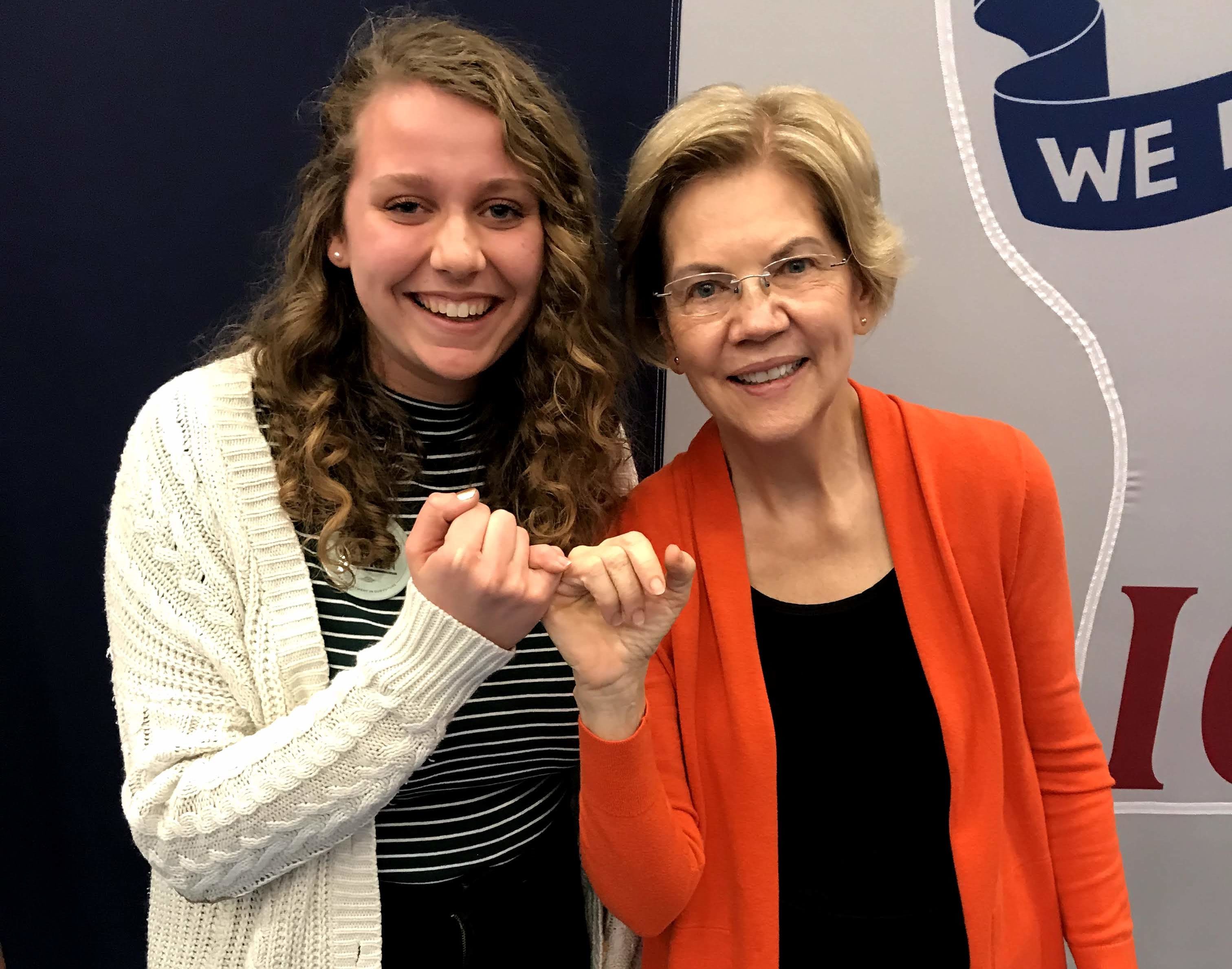
Emily Dalgleish and Senator Elizabeth Warren make a pinky-promise, a staple of Warren meet-and-greets with young women.
By Emily Dalgleish, Opinions Editor
The end of Warren’s campaign marks the fifth losing campaign that I have worked on. Four of those campaigns were women getting beat by white men. You might think that defeat gets less soul-crushing after a few times, but I haven’t found that to be true. There is a unique type of grief that comes in the aftermath of a campaign. The loss feels personal: it feels as if the country rejected the values, policies, and person you so deeply believe in. It makes you question what you were fighting for, wonder what went wrong, and regret that you didn’t do more. Yet after every campaign, I still return to hope.
I donated two weeks to knocking doors in Iowa, many increments of three dollars, hours texting and calling voters, and a lot of hope to the Warren campaign. Every bit was completely worth it. I did very little relative to the people I met on the campaign, who had donated their lives to her campaign, becoming organizers, interns, or even full-time volunteers. Those people would say it was worth it, too. A campaign’s success is not determined solely by electoral outcomes, but rather by the positive effect it had on the country.
In that way, Warren’s campaign was remarkable. She created sophisticated and in-depth plans to address our nation’s most pertinent issues, including plans on how to pay for health-care and public college. She held corporations and billionaires accountable, including Michael Bloomberg. We can thank her for pressuring Bloomberg to release women from non-disclosure agreements and for contributing to the downfall of his campaign. Her campaign trained a coalition of young people in grassroots campaigning. Warren inspired thousands of little girls with pinky promises that women should run for president. She challenged other candidates in their policies and in their behavior, making them better candidates with better platforms. She was and is an example of campaigning with a combination of genuine compassion, a fighting spirit, and unabashed brilliance.
Her campaign also vastly improved my life. Working on the campaign, I met some of the kindest people I have met. I became close friends with fellow college students from across the country who relocated to Iowa with me and shared the joys, struggles, and mishaps of campaigning. We were guided by bright organizers and interns whose strength and dedication kept us going on the most brutal Iowa days. I stayed with an incredibly welcoming couple who would diligently make sure I was fed and comfortable. I met hundreds of Iowans who were happy to see me at their door and listened to me enthusiastically give my pitch for Warren. I also met Elizabeth Warren, who was more energetic and gracious in person than I could have imagined. I am coming out of this campaign with personal and political lessons, countless adventures, and lifelong friendships.
Campaigns connect people who never would have otherwise connected and bring joy and love into politics. Being surrounded by people who have dedicated themselves to a greater purpose, talking to caring and thoughtful voters, and seeing that change is possible restores my faith in democracy.
Warren’s campaign made me a better person and made our country a better country. I am still devastated by the outcome, but this campaign has taught me to keep fighting. I am not sure which Democrat I will support next, but I am still not afraid to support them wholeheartedly, even with the risk of a painful loss.
It is much easier to say that the system is broken so it isn’t worth trying, or that Trump is going to win no matter what we do, or that all the candidates have flaws so none are worth supporting. In doing so, people abdicate their civic responsibility and cede their political power. In doing so, they become a part of the broken system that they condemn. Choosing hope over cynicism takes courage and energy, but every minute working toward the country that you believe in is worthwhile, no matter the outcome.

March 6, 2020
Elizabeth Warren is a liar (Pocohontas, pregnncy, Sanders’ anri-women remark), a socialist, and frenetic in style. Certainly, not Presidential timber.
Hillary Clinton is the most corrupt politician in US history.
For those whose politics are defined by gender, nominate a woman who is qualified and the country may think about it.
BTW, have you ever heard of Meir, Merkel, or Thatcher?
March 6, 2020
you are amazing!! Wow great article, very intimate and inspiring. Spread love not hate. You do you. Go off.
March 6, 2020
empowered women empower women!!!! This is so true in regards to you and your article and Warren. Wow!